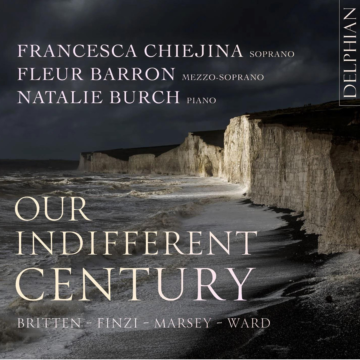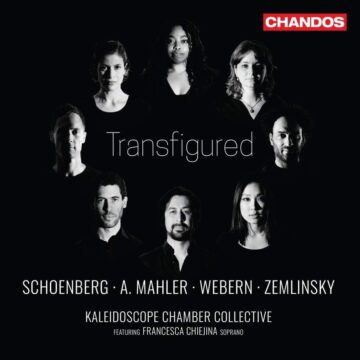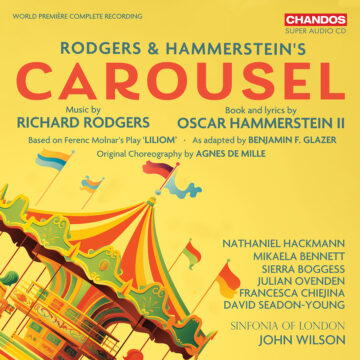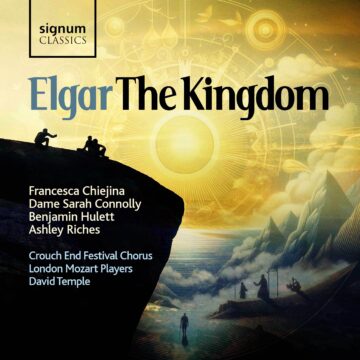Nigerian-American soprano Francesca Chiejina is a graduate of the Jette Parker Young Artists Programme at the Royal Opera House, Covent Garden. She is the winner of the 2023 UK Critics’ Circle Young Talent (Voice) Award.
Highlights in the 2025/2026 season include role debuts as Iphigenia Iphigenia in Tauris with Blackheath Halls Opera and Elena Il capello di paglia di Firenze at Oper Wuppertal, Mozart’s Requiem with the BBC Symphony Orchestra at the Barbican Hall and Elgar’s The Kingdom with the Crouch End Festival Chorus at the Royal Festival Hall as well as concerts with the Netherlands Radio Philharmonic Orchestra, the Royal Philharmonic Orchestra and at the London Song Festival.
Recent operatic highlights include: Jo Ann New Year with Birmingham Opera Company; title role Semele with Blackheath Opera; High Priestess Aida at Royal Opera House; Lauretta Il Trittico with Scottish Opera Mimì La bohème (Nevill Holt Opera, English Touring Opera); Melissa Amadigi (English Touring Opera); Miss Jessel The Turn of the Screw (OperaGlass Works); the title role in English Touring Opera’s film of Elena Langer and Glyn Maxwell’s Ariadne; Freia RhineGold (Birmingham Opera Company); her house and role debut as Clara Porgy and Bess at Grange Park Opera; and her debut with the Orchestre Symphonique de Montréal (Serena Porgy and Bess).
On the concert platform, she has sung Strauss Orchesterlieder with the Orchestra of Opera North and The BBC Philharmonic, Berg’s Seven Early Songs with the Sinfonia of London and John Wilson at the BBC Proms, Barber’s Knoxville: Summer of 1915 with the BBC Philharmonic and with the Royal Northern Sinfonia; and Handel’s Messiah with the Royal Philharmonic Orchestra at the Royal Albert Hall.
She is featured on the critically acclaimed recordings ‘Transfigured’ with the Kaleidoscope Chamber Collective (Chandos), ‘Our Indifferent Century’ (Delphian), Carousel with John Wilson and the Sinfonia of London (Chandos) and Elgar’s The Kingdom with the Crouch End Festival Chorus.
This biography is for information only and should not be reproduced.
Elgar's The Kingdom
Royal Festival Hall, January 2026
Francesca Chiejina (for me, the star of the evening) [was] a radiant Mary . . . her phrasing particularly Elgarian and subtle.
Colin Clarke, Seen and Heard International
Topping the charts was soprano Francesca Chiejina, who has a voice of amazing flexibility. Its syrupy richness is present throughout her range, but she demonstrated its capability for both the sweetest intimacy in “The Sun Goeth Down” (the floated notes on “the night watches” were magical) and incisive heft in ‘Pentecost’ (where she soared above choirs and orchestra in the final chorus).
Barry Creasy, MusicOMH
Górecki's Symphony of Sorrowful Songs
BBC Scottish Symphony Orchestra at Celtic Connections Festival, January 2026
Francesca Chiejina’s radiant soprano took up Mary’s short lament, opening up from quiet beginnings to a glorious climactic crown . . . her rich timbre turned soulful for Helena's prayer, [and in the final song she found] the darkness in the mother's search for her missing boy.
David Smythe, Bachtrack
Mozart's Requiem
BBC Symphony Orchestra at Barbican Hall, October 2025
[Francesca Chiejina's] voice always carried that superb blend of ease and power. The movement in her voice from an open, rich forte (loud) contrasted nicely with her graceful piano (soft) passages. Chiejina’s tone consistently rose to meet my ear but never in a way that felt as though she were demanding my attention.
Lennon Hu, Plays to See
Iphigenia in Tauris (Title Role)
Blackheath Halls Opera, September 2025
Chiejina brings profound, expressive warmth to Iphigenia, the priestess horrified at finding herself forced to sacrifice a visiting Greek who is saved only when he turns out to be her brother.
George Hall, The Stage
Francesca Chiejina was a wonderful Iphigenia: compassionate, vulnerable, inwardly (and outwardly) strong, her clarity of diction as noteworthy as that of dramatic purpose.
Mark Berry, Seen and Heard International
The overall impact was crowned by Chiejina’s gripping performance of this greatest of Gluck’s title roles - thrilling in the opening storm with supplicant chorus scattered to the winds, heartrending in her self-revealing solos.
Hugh Canning's Operalogue
Francesca Chiejina made an impassioned Iphigenia. She brought a sense of vibrant emotion to her vocal lines yet allied to a sense of style that paid tribute to Gluck's classicism. You never once felt Chiejina trying to push the music towards Norma or beyond as can sometimes happen. She sang with a lovely sense of ample line that drew you and made Gluck's music expressive, yet somehow compelling. Chiejina made you believe in Iphigenia and her various dilemmas through the opera really mattered. Iphigenia is the focus of the work and Chiejina repaid that in spades.
Robert Hugill, Planet Hugill
Elgar's The Kingdom
Crouch End Festival Chorus / Signum Records, May 2025
Francesca Chiejina was a new name to me. Her duet with Connolly in the “Pentecost” section is rapturous and perhaps the most exquisite music on the whole disc: I will be looking out for Chiejina from now on.
Bernard Hughes, The Arts Desk
'Francesca Chiejina shines in the Virgin Mary's glorious set piece "The sun goeth down" - and my goodness, what thrillingly refulgent top notes at the words "The Gospel of the Kingdom shall be preached in the whole wold."'
Andrew Achenbach, Gramophone Magazine
Light of Passage (Górecki Symphony no. 3)
Royal Opera House, February 2025
Henryk Górecki’s Symphony of Sorrowful Songs [is] conducted by Zoi Tsokanou and sung with passion and poise by Francesca Chiejina.
Sarah Crompton, The Observer
Soprano Francesca Chiejina, a success story of the house's Jette Parker Young Artists Programme, is incandescent throughout, a lyric-dramatic voice bringing more weight than the equally expressive Dawn Upshaw
David Nice, The Arts Desk
Plaudits, too, to the soprano Francesca Chiejina’s sterling vocals.
Donald Hutera, The Times
Nettie Fowler / Rodgers and Hammerstein's Carousel
Sinfonia of London / Chando's Records, September 2024
"The cast . . . is first-rate, with Francesca Chiejina bringing just enough operatic weight to Nettie Fowler."
Erica Jeal, The Guardian
"Francesca Chiejina brings operatic scale to 'You’ll Never Walk Alone'."
Richard Fairman, Financial Times
"Nigerian-American soprano Francesca Chiejina vocalizes Carousel’s most famous number, 'You’ll never walk alone' with thrilling emotion.
"It is hard to imagine Carousel will get a more inspired rendering than this one anytime soon."
Gianmarco Segato, La Scena Musicale
"Then there’s Francesca Chiejina whose contralto colour lends the requisite fruitiness to Netty Fowler’s two big numbers."
Edward Seckerson, Gramophone
"Francesca Chiejina brings operatic power to ‘You’ll Never Walk Alone’, as Nettie."
Rebecca Franks, Limelight Magazine
"Wilson also handpicks a cast of musical theatre performers, adding in operatic mezzo Francesca Chiejina who, as Nettie Fowler, gets to sing the anthemic 'You'll never walk alone' - and does so magnificently."
George Hall, BBC Music Magazine
Recital: Songs from My Homeland
Three Choirs Festival, July 2024
"An exemplary afternoon song recital, Songs from My Homeland, was given by the rising-star Nigerian American soprano Francesca Chiejina and the British pianist Jocelyn Freeman. The repertoire choice was ambitious as well as varied, from Benjamin Britten’s On This Island to Samuel Barber’s wistful Knoxville: Summer of 1915 and companion songs by Gerald Finzi, Francis Poulenc, Madeleine Dring, Florence Price and more. Chiejina and Freeman ended their engaging collaboration with three jubilant Yoruba songs (arranged by Ayo Bankole)."
Fiona Maddocks, The Guardian
Michael Tippett's New Year (Jo Ann)
Birmingham Opera Company, July 2024
Francesca Chiejina is heartachingly good as Jo Ann, her radiant soprano strong and sumptuous.
Clive Paget, The Guardian
Francesca Chiejina gave a moving, richly sung performance as Jo Ann
John Allison, Opera Magazine
The Birmingham soloists did the composer proud. Francesca Chiejina had the perfect, soaring lyric soprano for Jo Ann
Hugh Canning's Operalogue
The heart of the show was Chiejina’s Jo Ann – a luminous, intensely touching performance – and her relationship with the time-traveller Pelegrin
Richard Bratby, The Spectator
The main roles are all superbly cast, with Francesca Chiejna outstanding musically and dramatically as Jo Ann
Clare Stevens, The Stage
The clotted text is given power by a strong cast — notably Francesca Chiejina’s Jo Ann
Neil Fisher, The Times
Outstandingly well sung
Nicholas Kenyon, The Telegraph
Jonathan Dove's 'Odyssey' World Premiere
Bristol Beacon, January 2024
Francesca Chiejina was not in need of any additional power and impressed inasmuch as the smaller role of The Mother permitted (she bookends the piece, fearing for the welfare of Him and his siblings, whom she has exiled for their safety).
David Karlin, Bachtrack
Excellent
Rebecca Franks, The Times
Francesca Chiejina's Concert Repertoire
| Bach | Johannes-Passion |
|---|---|
| Barber | Knoxville: Summer of 1915 |
| Berg | Seven Early Songs |
| Elgar | The Kingdom |
| Górecki | Symphony no. 3 |
| Handel | Messiah |
| Mendelssohn | Elijah |
| Mozart | Requiem |
| Schubert | Winterreise |
| Strauss, Richard | Four Last Songs |
| Vaughan Williams | Serenade to Music |
| Verdi | Requiem |
Francesca Chiejina's Opera Repertoire
| Britten | Miss Jessel, The Turn of the Screw |
|---|---|
| Brook adapted from Bizet | Micaela, La tragédie de Carmen |
| Gershwin | Clara, Porgy and Bess Serena, Porgy and Bess |
| Handel | Title Role, Semele Title Role, Alcina Melissa, Amadigi Ifigenia, Orestes |
| Monteverdi | Melantho / Love, The Return of Ulysses |
| Mozart | Arbate, Mitridate, re di Ponto |
| Offenbach | Antonia, Les contes d'Hoffmann |
| Puccini | Mimì, La bohème Lauretta, Gianni Schicchi |
| Rossini | Aldimira, Sigismondo |
| Stravinsky | Ann Trulove, The Rake's Progress |
| Tippett | Jo Ann, New Year |
| Verdi | High Priestess, Aida Countess Ceprano, Rigoletto Lady-In-Waiting, Macbeth Voice from Heaven, Don Carlo Ines, Il Trovatore |
| Wagner | Freia, Das Rheingold |
These photos are available to be downloaded.
Right click on a desired image and select the "Save Link As" option.





